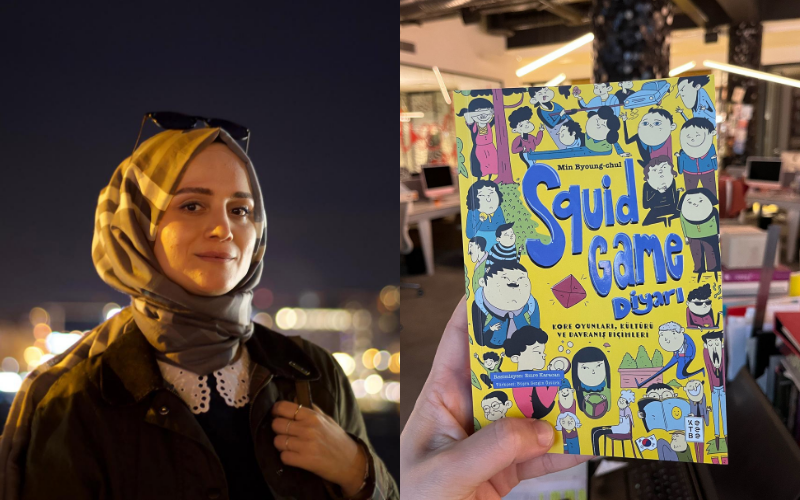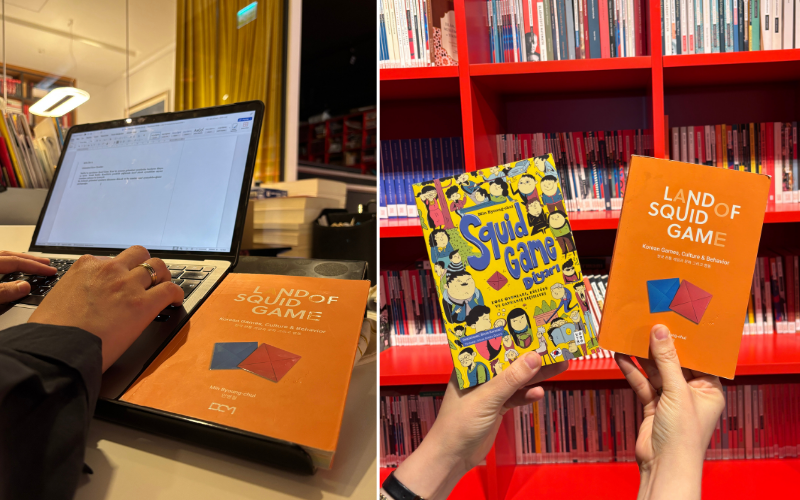"Land of Squid Game," a cultural guidebook written by Min Byoung-chul, an Endowed Chair Professor at Chung-Ang University in Seoul, was originally published in 2023. On 1 May 2025, the book was published in Turkish under the title ‘’Squid Game Diyarı’’ by Ketebe Publishing. The book delves into traditional Korean games, cultural customs, and social practices, helping readers understand the values and traditions that shape everyday life in Korea. Inspired by the popular Netflix series ‘’Squid Game,’’ it goes beyond the show to introduce readers to real Korean culture, explaining the meaning and background of several traditional games like Ddakji (paper flipping), Red Light-Green Light, and Dalgona (honeycomb toffee challenge). The illustrations in the book were done by Emre Karacan, and the book was translated into Turkish by Büşra Sezgin Öztürk.
Büşra Sezgin Öztürk graduated with honors from Istanbul University, where she studied both History and Sociology. She also completed a pedagogical formation program, which gave her valuable insight into learning processes and how knowledge is shaped and transmitted, something that has enriched both her academic and editorial work. Currently, she’s pursuing her master’s degree in Political Science at Marmara University.
Over the years, Büşra has worked in state archives, literary journals, and various publishing houses, gaining hands-on experience in the world of publishing. Today, she works as an editor and publishing coordinator at Ketebe Publishing, the house that published the Turkish edition of ‘’Land of Squid Game.’’ This role has allowed her to be deeply involved not only in translation but also in the broader process of bringing books to life in a new cultural context. Her academic background as a historian gives her a strong research-based approach, while her training in sociology sharpens her sensitivity to cultural and social values. These qualities, combined with Büşra’s pedagogical background, helped her approach this book with analytical care, cultural empathy, and an awareness of how stories resonate with different audiences.
Since the Turkish edition was published as part of a youth literature series, she believes her pedagogical training added another layer of intentionality and responsibility to the work, allowing her to engage with the needs and expectations of young readers more consciously. Büşra Sezgin Öztürk is also a mother to an 8-year-old son. Being a parent has further deepened her connection to themes like play, learning, and generational dialogue, many of which are present in this book.
I wanted to interview the Turkish translator of ‘’Squid Game Diyarı’’ because translating a book isn’t just about converting words, it’s about bringing one culture into another in a way readers can understand.
In an email interview on May 27-30, she shared her thoughts on the choices and challenges she faced while translating the book, as well as what she enjoyed most about working on it.
1. How did your interest in Korean begin, and what is your experience in this field?
My interest in Korean culture started during my teenage years, mainly through K-dramas. What began as pure curiosity soon turned into a deeper fascination. As I kept watching, I started noticing subtle cultural parallels between Korean and Turkish society, things like family dynamics, respect for elders, emotional expression, and social codes of behavior. These similarities sparked my academic interest, and over time, I found myself wanting to understand the culture beyond what I saw on screen. That’s when I began to explore Korean literature, history, and everyday customs in more depth. This journey led me to opportunities like translating ‘’Land of Squid Game,’’ which allowed me to combine my language skills with my long-standing passion for Korean culture. So, in a way, it started with stories, and it continues with stories, only now I help carry them across languages.

2. What led you to take on the translation of ‘’Land of Squid Game’’?
As someone who has always been interested in Korean culture and literature, this book immediately caught my attention. ‘’Land of Squid Game’’ is not only about the popular series, but also explores deeper social and cultural dynamics in Korea. It offers reflections on the country’s values, behaviors, and collective experiences, all through the lens of a global phenomenon. I believed the book would resonate with Turkish readers, who are already highly engaged with K-dramas, by giving them a broader cultural context. That’s why I wanted to take part in bringing this work to Turkish.
3. How do you convey the cultural references in the book ‘’Land of Squid Game’’?
The book includes many Korean-specific concepts: traditional games, social customs, family roles, and public behavior. My aim during translation was to make these references understandable without losing their original flavor. Instead of simplifying or replacing them, I used cultural explanation techniques. I included footnotes when needed and adapted the flow of the text so that Turkish readers could stay immersed in the content while learning about a different culture. I tried to keep a balance between clarity and authenticity.
4. What did you find to be the most difficult aspect of translating this book?
The most challenging part was the tone. The book combines cultural insight with a light, accessible style. Capturing that tone in Turkish, while also ensuring the meaning stayed intact, required careful choices. Some concepts don’t exist in Turkish culture, so I had to explain them without breaking the rhythm of the narrative. Maintaining this balance was both difficult and rewarding.

5. Did you notice similarities between Turkish and Korean cultural values while working on the book?
Yes, quite a few. Many traditional children’s games described in the book felt very familiar: tug of war, marbles, hopscotch, jump rope, five-stone (gonggi), spinning tops, handkerchief game, and even a game similar to “Uzun Eşek” that we played in our childhood. Seeing these parallels was a joyful surprise. There were also many shared values and customs, like showing respect to elders, not speaking loudly in public transport, removing shoes indoors, waiting for older people to finish their meal before leaving the table, and staying with family until marriage. Concepts like ‘’Jeong’’ which refers to deep emotional bonds, reminded me of how we value heartfelt connections in Turkish culture. These similarities show that, beyond geographical distance, our cultures share many unspoken codes of behavior. Discovering these while translating made the process even more meaningful for me.
6. What aspects of this book do you enjoy the most?
What I enjoyed most was how the book went beyond the entertainment value of Squid Game and used it as a gateway to discuss real issues in Korean society. It invites readers to think about culture, community, and identity, all in an accessible tone. Also, the Turkish edition became a very unique project. We completely redesigned the illustrations. A well-known Turkish illustrator worked closely with the author and the Korean team to create visuals that stayed true to Korean culture but were tailored to appeal to local readers. I followed this process closely, and it gave me the chance to contribute not just as a translator but as someone helping shape the cultural adaptation of the book. So in this project, I wasn’t just translating words, I was helping carry a whole story, with its visuals and spirit, into a new cultural space. That was truly enjoyable.
7. What was your reaction upon viewing the completed book?
When I first held the printed Turkish edition in my hands, I felt proud and happy. Translators often work behind the scenes, but this time, I could see how much care was put into every detail, from the language to the design. It felt good to know that our version was faithful to the original and meaningful for local readers. Seeing it all come together was deeply satisfying, both professionally and personally.
Through her thoughtful approach, Büşra Sezgin Öztürk helped bring Korean traditions, values, and games to life for Turkish readers.
*This interview was conducted in English by an Honorary Reporter for Korea.net, and none of its content may be copied or used without permission.
How about this article?
- Like4
- Support1
- Amazing0
- Sad0
- Curious0
- Insightful0


